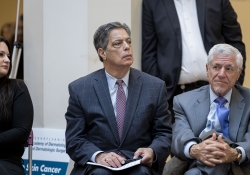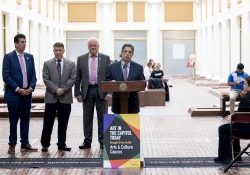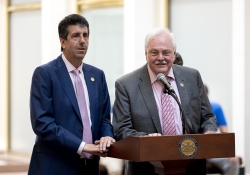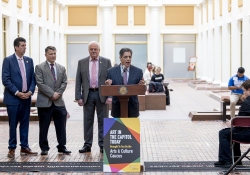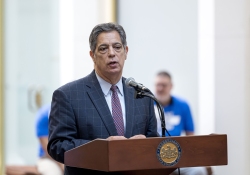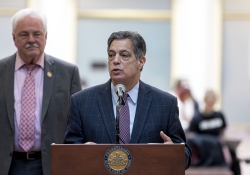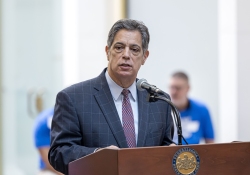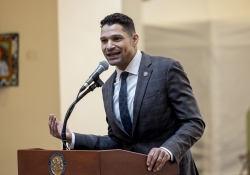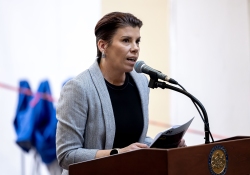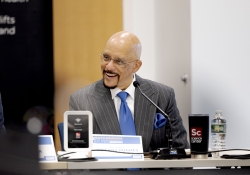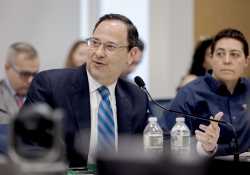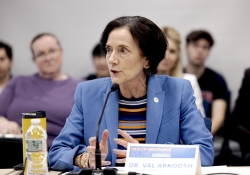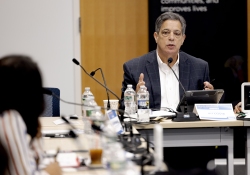PITTSBURGH, PA – Mayo 14, 2025 – Today, the Pennsylvania House of Representatives passed HB 500, a critical part of Governor Shapiro’s Lightning Plan which updates the Pennsylvania Economic Development for a Growing Economy (PA EDGE) Tax Credit Program to bring next-generation energy, fuel, and dairy development to Pennsylvania. That bill now heads to the Senate for consideration.
With a looming budget deadline of Junio 30, Senator Jay Costa (D-Allegheny) and Senator Nick Pisciottano (D-Allegheny), who circulated a co-sponsorship memo for the Senate version of the PA EDGE Tax Credit Program, are calling for swift, good-faith discussions about how to lower energy costs for Pennsylvania’s consumers.
“As families face the prospect of higher prices for goods, food, and services, the time for a bold, visionary plan for energy in Pennsylvania is now,” said Sen. Costa. “The EDGE Tax Credit is a key pillar for uplifting our commonwealth’s working families. I will continue to champion the Lightning Plan in order to shore up our energy market and modernize tax credit programs. Let’s get this done.”
“Our plan to revamp the EDGE Program is about delivering real relief to working families across Pennsylvania,” said Sen. Pisciottano. “By lowering energy costs, creating high-wage jobs, and investing in the industries of the future, we’re making smart, targeted changes that put Pennsylvanians first and ensure our economy stays competitive for the long haul.”
Learn more about the Senate Democrats’ commitment to affordable energy for every Pennsylvanian here.
#####
HARRISBURG, PA – Mayo 13, 2025 – Today, members of the Pennsylvania Legislative Arts and Culture Caucus and Pennsylvania artists gathered at the capitol in celebration of “Arts Advocacy Day.”
“As a lifelong lover of the arts, I am always delighted to join fellow enthusiasts and advocates to bring attention to the importance of investing in the arts,” said Sen. Jay Costa (D-43). “I will continue to raise my voice in support of the social, economic, educational, and cultural benefits of a vibrant arts community in Pennsylvania.”
Senator Costa and the other members of the bipartisan, bicameral caucus expressed their support to – Sen. Pat Stefano (R-32), Rep. R. Lee James (R-64) and Rep. Joe Ciresi (D-146) – joined advocates in calling for continued investments in arts and culture funding in order to boost local economies, tourism, and downtown revitalization.
“The arts are more than a cultural asset, they’re a economic propeller,” Stefano said. “From driving tourism and supporting small businesses, to inspiring young minds, the arts have measurable returns on investment. When we support the arts, we are strengthening Pennsylvania’s economy.”
Following the noon press conference, Pittsburgh Ballet Theatre principal dancers Tommie Lin Kesten and Colin McCaslin performed segments of “The Nutcracker “and “Emeralds” in the capitol’s East Wing Rotunda. Currently, the two dancers are respectively starring as Dorothy and the Tin Man in the Ballet Theatre’s production of “The Wizard of Oz.”
“The arts do so much for our present and future economy,” James said. “Through inspiration and creativity, art takes on a life of its own where artists can reach new heights in storytelling and visualization. I will support local organizations, and I thank them for their positive contributions to Pennsylvania.”
The non-profit advocacy group, Creative Pennsylvania – formerly known as Citizens for the Arts – served as a key organizational force in the day’s events. Supporting their mission to build a more inspired, connected and culturally rich Pennsylvania, Creative Pennsylvania brought in advocates from across the commonwealth to meet with legislators about the importance of supporting the arts.
More information about the caucus is available at PAArtsCultureCaucus.com.
Downloadable video footage of today’s press conference and ballet performance, along with still photos, are available upon request.
###
Philadelphia, PA − Abril 23, 2025 − On Martes, Abril 22nd, Senator Vincent Hughes hosted an intergovernmental roundtable with federal, state, and local lawmakers and healthcare leaders from across Pennsylvania. The goal was to bring a variety of stakeholders together to discuss what federal healthcare cuts could mean for Pennsylvania’s entire healthcare ecosystem and the people who rely on health benefits from Medicaid, CHIP, Pennie, and provisions in the Affordable Care Act that have made healthcare more accessible and affordable.
“It’s important for this group to affirm the magnitude of these potential cuts,” said Senator Hughes. “These cuts threaten access to quality healthcare and coverage, but they also threaten the well-being of our hospital systems, our nursing homes, and our healthcare workers. We need the public to understand that our healthcare system is extremely interconnected. If congressional Republicans move forward with $880 billion in cuts, our entire healthcare and health insurance system will feel it.”
In Pennsylvania, over 3 million residents, or 23% of the Commonwealth’s population rely on Medicaid or CHIP for health insurance. 39% of all Pennsylvania children are enrolled in Medicaid or CHIP. Roundtable participants stressed the huge financial gap Pennsylvania will have to grapple with if federal lawmakers decide to cut health benefits.
Senator Jay Costa explained, “The argument coming out of Washington is that they’re not going to cut Medicaid, they’re just modifying eligibility. They say that’s not a benefit cut, but at the end of the day those are reductions. It will then be up to the states to make hard decisions about how to respond to the loss of federal dollars and coverage.”
Several roundtable participants noted that federal cuts will also hurt local economies. DHS c said, “For all of us, but for rural communities in particular, hospitals are often the foundation of a community’s economic viability, health, and strength. And when a hospital closes, that’s often the largest employer in the community.”
“Who’s impacted by these cuts? Everyone, everyone will be impacted,” said Dr. Ala Stanford, founder of the Black Doctors Consortium, professor at University of Pennsylvania, and former HHS Regional Director.
The group of over 25 lawmakers and leaders agreed that now is the time to be reaching out to both Republican and Democrat lawmakers in Washington to make the case for how catastrophic healthcare cuts could be. Laura Guerra, Congressman Evans’ Healthcare Legislative Assistant, noted that language about what specifically will be cut could surface around the end of Mayo.
The intergovernmental roundtable was hosted at the University City Science Center, located in Senator Hughes’ district. A video of the roundtable is available online.
Roundtable participants included:
Federal Lawmakers
- Congressman Dwight Evans
- Joined by Laura Guerra, Healthcare Legislative Assistant
- Congresswoman Mary Gay Scanlon
State Lawmakers
- Senator Jay Costa, Senate Democratic Leader
- Senator Vincent Hughes, Senate Democratic Appropriations Chair
- Senator Maria Collett, Chair of the Senate Aging and Youth Committee
- Senator Sharif Street, Chair of the Banking and Insurance Committee
- Office of House Speaker Joanna McClinton
- Represented by Hans Van Mol, District Office Director, Office of House Speaker Joanna McClinton
State Appointed Leaders
- Dr. Val Arkoosh, MD, MPH, Secretary of the Pennsylvania Department of Human Services
- Michael Humphreys, Commissioner of the Pennsylvania Insurance Department
- Jason Kavulich, Secretary of the Pennsylvania Department of Aging
- Devon Trolley, Executive Director of Pennie
City Lawmakers and Leaders
- Councilmember Nina Ahmad, Chair of the Public Health and Human Services Committee
- Office of Councilmember Jaime Gauthier, District 3 and Chair of Housing, Neighborhood Development, and the Homeless
- Represented by Mariya Khandros, Chief of Staff
Healthcare Leaders and Advocates
- Roy Afflerbach, Government Affairs, Pennsylvania Association of Area Agencies on Aging (P4A)
- Donna Bailey, CEO of Community Behavioral Health
- Dr. Cheryl Bettigole, Professor, Clinical Family Medicine & Community Health, Perelman School of Medicine
- Peter Grollman, Senior Vice President, External Affairs, Children’s Hospital of Pennsylvania
- Krista Hoglund, President, Jefferson Health Plans
- Emily Katz, Executive Director, PA Medicaid Managed Care Organizations
- Ali Kronley, Vice President and Director of United Homecare Workers of Pennsylvania, SEIU
- Katherine Levins, Vice President of Public Policy & Government Affairs, Temple Health
- Garry Pezzano, President and CEO, LeadingAge PA
- Bill Ryan, Senior Lobbyist, Saxton and Stump
- Zach Shamberg, President and CEO, PA Health Care Association
- Dr. Ala Stanford, Founder of the Black Doctors Consortium, Professor at University of Pennsylvania, Former HHS Regional Director
- David Wilson, Vice President of Government and Community Relations, Drexel Health
- Tiffany Wilson, CEO of University City Science Center
HARRISBURG, PA – Abril 16, 2025 – Earlier today, the Pennsylvania State Police filed an affidavit indicating that Cody Balmer, who stands accused of assault and arson related to the Domingo morning fire at the Governor’s residence, placed a 911 call during which he stated that he “…will not take part in his plans for whatever he wants to do to the Palestinian people.”
The alleged acts of assault and arson took place on the first night of Passover, a Jewish holiday, which Governor Shapiro was observing with his immediate and extended family. So far, no hate crime charges have been filed. The decision to do so belongs to District Attorney Francis T. Chardo.
In response, Senate Democratic Leader Jay Costa, whose district includes the site of the 2018 Tree of Life massacre which took the lives of eleven Jewish worshippers, releases the following statement:
“I am appalled and disgusted to learn of emerging evidence that Governor Shapiro’s support of Israel and his Jewish faith may have contributed to the suspect’s motivation to attack him and his family. Every single Pennsylvanian, of every faith and creed, must be free to gather, pray, worship, and celebrate without fear.
“Our Jewish friends and neighbors are facing unprecedented threats and attacks from antisemitic actors, and I am calling on everyone to do their part to rebuke antisemitism in all its forms, from online hatred to interpersonal violence and everything in between.
“Additionally, let me be as clear as I can: Political violence is wholly unacceptable, full stop. No matter your political opinions, our elected leaders of every party, their staff, and their constituents deserve to move safely and freely through our commonwealth.
“As the Pennsylvania State Police continue to investigate this crime, I want to offer my gratitude and support as they bring the full weight of the justice system to bear on this situation. I will not be deterred from raising my voice and organizing the legislature to deliver safety and protections for our Jewish families.”
Senator Costa and Representative Dan Frankel recently introduced a package of bills to strengthen Pennsylvania’s response to hate crimes.
Learn more about the Pennsylvania Senate Democrats’ commitment to safe communities for every Pennsylvanian here.
PITTSBURGH, PA − Abril 15, 2025 − Today, Senate Democratic Policy Committee Chair Nick Miller held a hearing to examine the needs of regional mass transit systems and assess ways to ensure that their benefits remain accessible to residents and local businesses in Pennsylvania.
“Across our Commonwealth, we have noticed a rising mass transit funding crisis characterized by substantial cuts in services due to budget limitations. Consequently, we are jeopardizing the daily lives of our residents who depend on public transportation to get to work, visit friends and loved ones, and traverse these regions for everyday needs,” said Senator Miller. “Though today’s hearing focused on Pittsburgh and Allegheny County, we are seeing reduction in access to transit in every corner of the commonwealth, including rural and suburban areas. In my district, Lehigh and Northampton Transportation Authority (LANTA) has also been impacted by this crisis and recently reduced services. Today’s hearing highlights the importance of collaboration to identify a solution that ensures our mass transit systems remain accessible to all residents, regardless of age or ability.”
“Today’s hearing was a critical step in understanding the work before us in delivering excellent public transit for every Pennsylvanian, and I am grateful for all the testifiers who shared their knowledge and expertise with us,” said Senator Costa. “Public transit is critical infrastructure for our students, our seniors, our workers, our tourists, our disabled friends and neighbors, our parents, and our climate. While providing essential services to riders, public transit also fuels our region’s economy by connecting workers to workplaces, improving access to family sustaining jobs and providing workforce needs for employers. I look forward to making progress in this critical space together as we move forward.”
“Public transportation is an essential asset to communities across the commonwealth, including here in Western Pennsylvania where transit authorities serve residents, businesses, and visitors,” said Senator Fontana. “It is incumbent upon us to ensure long-term sustainability of our transit systems so that we not again facing drastic cuts to the services so many our constituents depend upon.”
“As a new member of the PRT board and the State Senator representing the region of Allegheny County with the most service cuts since 2013, I am committed to finding a long-term funding solution for our public transit system to not only keep it alive, but for it to thrive,” said Senator Lindsey Williams. “Our people, our workforce, and the future economic prosperity of Pennsylvania depends on access to transportation. I’m grateful to today’s testifiers, who represented the senior and disabled communities and our region’s largest employers and clearly communicated the dire need for a funded system of public transportation.”
“We need to think boldly about the future of transportation in Allegheny County and across Pennsylvania,” said Senator Pisciottano. “We are actively working with state and local leaders to explore solutions that address the current funding gaps and prevent harmful service cuts, including advocating for sustainable, long-term investments in public transit to support riders and ensure equitable service. By making smart investments today, we can build a transit system that serves our communities for generations to come.”
Katharine Kellman, CEO of Pittsburgh Regional Transit, stated the importance of finding a funding solution that will avoid service disruptions and economic setbacks.
“If we don’t come together and identify a lasting solution, the fiscal cliff transit agencies across Pennsylvania face ultimately will make it harder to support economic opportunities, attract and retain employees, and support the social and business needs of our Commonwealth,” said Katharine Kellman. “Transit is not and should not be an optional priority—it is a foundational one.”
Michael Carroll, Secretary of Pennsylvania Department of Transportation (PennDOT), highlighted their commitment to strengthening the public transportation system through continued collaboration, innovation, and strategic investments.
“Across Pennsylvania, 53 public transit agencies deliver millions of trips every year—supporting mobility in every one of our 67 counties. In rural areas, small towns, and cities like Pittsburgh, transit is a daily necessity,” said Michael Carroll. “In fact, outside the Philadelphia and Pittsburgh regions, over 45,000 trips occur every day, keeping tens of thousands of cars off our roads and reducing congestion and emissions.”
Kendra Ross, Head of Social Impact at Duolingo, expressed concerns amongst the growing workforce in Pittsburgh.
“We’re fortunate to be well-served by PRT today and we hope that that can continue. The proposed service cuts will directly impact us as well as many other businesses in our community, with several lines in East Liberty set to be cut or significantly scaled back,” said Kendra Ross. “It’s been a topic of significant concern among our workforce; I have heard from many of our employees, worried about what this will mean for their commute.”
Lauren Poskin, the Executive Director of Age-Friendly Greater Pittsburgh, emphasized the need to invest in public transit for the community’s well-being, economy, and quality of life.
“Transportation avoids institutionalization, which is both extremely costly and not what people want,” said Lauren Poskin. “People want to age in community. Both from the human and fiscal perspectives, this is an investment we can’t afford not to make.”
The panelists for today’s hearing included:
- Michael Carroll, Secretary, Pennsylvania Department of Transportation
- Donminika Brown, Chief Financial Officer, Pittsburgh Regional Transit
- Katherine Kelleman, CEO, Pittsburgh Regional Transit
- Ross Nicotero, President Business Manager, A.T.U. Local 85
- Dan Yablonsky, Digital Organizing Director, Pittsburghers for Public Transit
- Laura Poskin, Executive Director, Age-Friendly Greater Pittsburgh
- Kendra Ross, Head of Social Impact, Duolingo
- Vic Vercammen, Vice President, Safety, Regulatory & Government Affairs, Giant Eagle, Inc
- Dr. Mark Rubino, President, Allegheny Health Network Forbes and Allegheny Valley Hospitals
Senator Nick Miller was elected Policy Chair of the Senate Democratic Caucus in Diciembre 2024. Today’s hearing was his fifth as Chair.
Footage of the hearing, as well as the written testimony of the panel, is available at PASenatorMiller.com/Policy. Photographs and downloadable video are available upon request.
Learn more about the PA Senate Democrats commitment to protecting our commonwealth’s healthcare needs and other legislative priorities at www.pasenate.com.
###
Testimonio
Panel 1: The Commonwealth’s Outlook
Panel 2: The State of Pittsburgh Regional Transit
Panel 3: Community Impacts
Panel 4: Regional Economic Effect
Additional Testimony
PITTSBURGH, PA – Abril 10, 2025 – Today, Senator Jay Costa joins Representative Dan Frankel to announce the reintroduction of a package of bills meant to strengthen law enforcement’s response to hate crimes, improve tracking, advocate for victims, and prevent future hate-based crimes.
This legislation is a direct response to the 2018 mass shooting at Pittsburgh’s Tree of Life building, during which a white supremacist murdered eleven worshippers in three Jewish congregations. To this day, this was the single deadliest act of antisemitic violence in American history. However, since then, the instance of hate crimes has only risen against racial minorities, religious groups, and members of the LGBTQ+ community.
As noted in the Senate co-sponsorship memorandum, “According to the Pennsylvania State Policy Uniform Crime Reporting System, between 2020 and 2021, hate crime incidents in Pennsylvania more than doubled statewide. Between 2021 and 2023, the Department of Justice reports hate crimes almost doubled again in Pennsylvania. Worse, hate crimes are often misreported because of a lack of training or tracking.”
Already, Senator Costa and Representative Frankel have championed the creation and growth of the Nonprofit Security Grant Program. Signed into law in 2019, Act 83 directs PCCD to administer grants to nonprofit organizations who principally serve individuals, groups or institutions that are included within a bias motivation category for single bias hate crime incidents as identified by the FBI’s Hate Crime Statistics publication.
“I have been extremely proud to fight for legislation so that the people who call Pennsylvania home have safe communities, gathering spaces, and houses of worship,” said Senator Costa. “Hate-based crimes shake our community to the core, endangering our sense of belonging, safety, and identity. I remember vividly the immediate aftermath of the Tree of Life massacre, and I want to thank everyone who has collaborated on real solutions to protecting members of marginalized communities and ensuring we can prevent hate-based crime throughout our commonwealth. I look forward to delivering safe neighborhoods where everyone can live, dress, gather, sing, worship, and join in fellowship.”
Last session, a similar package was passed out of the House of Representatives, but Republican leadership in the Senate declined to take up the legislation.
“No one should ever feel unsafe because of who they are, where they come from, or how they look, love, or pray,” said Rep. Frankel. “With this legislative package, Pennsylvania has the opportunity to stand up for our most vulnerable neighbors and recognize the deep harm hate crimes inflict—not just on individuals, but on entire communities.”
The House version of the Anti-Hate Crimes Package, which Representative Frankel introduced along with Representative Napoleon Nelson, is accessible here.



